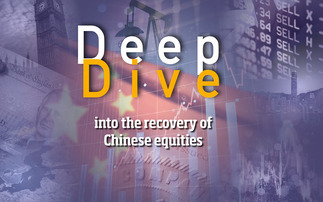Historians may look back on 2020 not only as the year of the Covid-19 pandemic, but also as the year in which Asian economic leadership came to the fore. While all nations have wrestled with the fallout from the virus, and introduced economic and health measures to address it, Asian economies as varied as China, Singapore, Japan and South Korea have demonstrated the benefits of early and continuous containment. This approach has so far allowed many countries in the region to recover more quickly and without some of the larger scale policy interventions required in the West.
As we enter 2021, this is likely to support corporate earnings growth with a greater level of sustainability. Moreover, the emphasis on sustainability of all kinds - from reshaping supply chains to greening the economy - looks set to continue across the region and potentially accelerate as Asia catches up with, and sometimes even overtakes, other regions.
Increasing divergence in economic policy
The dynamics of Asia have changed. The region used to be viewed by investors as a tactical play geared to global economic growth. There were questions about the reliability of data and whether debt levels would be manageable. Debt remains high, especially in countries such as China, but it is also high and rising in the West as the bills come due for Covid stimulus packages. And while any resurgence of inflation in Asia could trigger a pickup in yields, increasing the interest and refinancing burden for companies, Asia has been learning to live with the consequences of elevated inflation for far longer than the West.
Those Asian countries with higher interest rates may even avoid some of the negative consequences induced by low rates that have weighed on Japan's economic growth. But some have been loosening policy in a climate of lower inflation than in the past. Indonesia, for example, has engaged in extraordinary measures such as quantitative easing, previously viewed as only possible in developed economies. One surprising takeaway from 2020 was the relative weakness of the dollar. This has carried over into our more favourable outlook on Asian assets as we head into 2021.
Meanwhile, other broader factors are increasingly at play that set the stage for a more robust regional economy. These include elements of greater political stability and higher trust in institutions and their ability to tackle crises. Another key trend that was already underway due to rising trade tensions is greater intra-regional reliance. The pandemic has only accelerated this phenomenon, with important parts of supply chains being brought closer to home in Asia, especially in China.
Stakeholder capitalism through an Asian lens
Some of the headwinds Asia has faced over last ten years are receding. The trend of an ever-stronger US dollar has reversed, while oil prices remain lower than historical averages. At the same time, the structure of Asian economies means there is less of a gap between markets and the real economy than in countries such as the US.
As economies in the West start to remake their economic model with an eye on inclusive or responsible capitalism, it could be argued that the mixed capitalism model, much more the norm in Asia, is part of the reason for better alignment of government policy and the corporate sector across several areas. These include the digitisation of the economy, the consideration of social impact and even the management of the pandemic.
The outlook for markets in 2021
In terms of how a more resilient economic model could translate into investment opportunities in Asia, our Analyst Survey recently showed that China could lead the way in recovering from the domestic economic effects of the pandemic, perhaps as soon as spring 2021. The chart below shows the number of months our analysts expected it to take for companies in their sectors to operate at a stable level, unimpaired by the virus. When asked the question in October 2020, the average for analysts covering Chinese companies was four months.
Groundhog Day except for China in terms of getting back to normal
Average of analyst responses by sector when asked in May, June and October 2020. Question: "How many months from now until your sector is operating at a stable level unimpaired by the virus?" Source: Fidelity International, October 2020.
Chinese GDP is likely to be among the few positive growth figures globally in 2020, as well as in 2021. Earnings are projected to be more resilient across the entire Asia region, including Japan. Winners in 2020 have been, as elsewhere, in the technology and healthcare sectors. The rapid rise of e-commerce in China has been accelerated by the pandemic but there is further room for growth as more areas are digitised and more innovation is domestically driven. Manufacturing has also rebounded from the pandemic closures and is boosting demand for certain commodities and exports from countries such as Germany.
Asian economies demonstrate earnings resilience
Source: Fidelity International, 14 November 2020. Chart shows aggregated earnings estimates by region (CY21 vs CY20) and (CY20 vs CY19).
At a market level, another major shift is underway. China has progressively opened up its onshore equity and bond markets to foreign investors in recent years through the Qualified Foreign Institutional Investor schemes and Connect programmes. Foreign participation is rising and has had a further leg up in 2020. This is partly due to a further relaxation of controls around onshore inflows. But it also reflects the prevailing macro and policy forces in the wake of Covid-19. China, for example, has chosen not to slash rates to the extent seen in the US. That makes it likely that more global funds will boost their allocation to Chinese assets. Higher Chinese bond yields in a weaker dollar environment could be especially attractive for income-focused investors.
Foreign ownership in Chinese government bonds jumps
Source: Bloomberg, ChinaBond, Fidelity International, October 2020
Across Asia as a whole, if current trends continue and the region does not suffer the setbacks of further waves of the virus, then the recovery is likely to broaden out. Countries that have been left behind such as India could catch up fast in 2021, with more value trades working in Asia than in Western economies due to the greater strength and more linear shape of the Asian economic recovery. While India has struggled to contain the Covid-19 virus, we continue to believe the country has significant potential. It benefits from structural growth trends, and there is an increasing likelihood that over the coming decade more technology and manufacturing jobs will relocate there from across the region, driven by US-China trade tensions and India's own development.
Climate is most prominent ESG issue, but social elements remain critical
Despite the pandemic, the biggest issue in environment, social and governance (ESG) terms for the world and particularly for Asia in 2021 is likely to be climate change. 2020 has brought a series of net or near zero pledges from countries such as China and Japan and from major corporates such as PetroChina. Turning to the S in ESG, we expect investors will continue to pursue engagements on societal issues around Asia, with a particular focus on human rights and supply chain conditions.
At a corporate level, we find on-the-ground engagement to be a powerful method of understanding how a company is operating and of encouraging best practice in terms of labour conditions and supply chain management. ESG concerns raised by international investors are increasingly being considered by domestic investors too. During the pandemic, for example, companies in Asia have been taking steps to protect and support their workers for both social and commercial reasons.
Europe may lead the world in terms of sustainability more broadly, but Asia is catching up fast. More governance and environmental regulation is helping to speed up this transition. This creates an opportunity for Asian companies to add value not just in terms of continuing growth trends, as they have focused on in the past, but also in terms of attracting greater levels of investor capital through better sustainability characteristics.
Watch Paras Anand's video outlook interview
Learn about Fidelity's Asia expertise and investment strategies
Important information
This information is for investment professionals only and should not be relied upon by private investors. The value of investments can go down as well as up and you may not get back the amount invested. Investors should note that the views expressed may no longer be current and may have already been acted upon. Changes in currency exchange rates may affect the value of an investment in overseas markets. Investments emerging markets can also be more volatile than other more developed markets. The value of bonds is influenced by movements in interest rates and bond yields. If interest rates and so bond yields rise, bond prices tend to fall, and vice versa. The price of bonds with a longer lifetime until maturity is generally more sensitive to interest rate movements than those with a shorter lifetime to maturity. The risk of default is based on the issuer's ability to make interest payments and to repay the loan at maturity. Default risk may therefore vary between different government issuers as well as between different corporate issuers. Sub-investment grade bonds are considered riskier bonds. They have an increased risk of default which could affect both income and the capital value of the fund investing in them. Reference in this article to specific securities should not be interpreted as a recommendation to buy or sell these securities, but is included for the purposes of illustration only. Investments should be made on the basis of the current prospectus, which is available along with the Key Investor Information Document, current annual and semi-annual reports free of charge on request by calling 0800 368 1732. Issued by FIL Pensions Management, authorised and regulated by the Financial Conduct Authority and Financial Administration Services Limited, authorised and regulated by the Financial Conduct Authority. Fidelity International, the Fidelity International logo and F symbol are trademarks of FIL Limited. UKM1220/32610/SSO/NA













